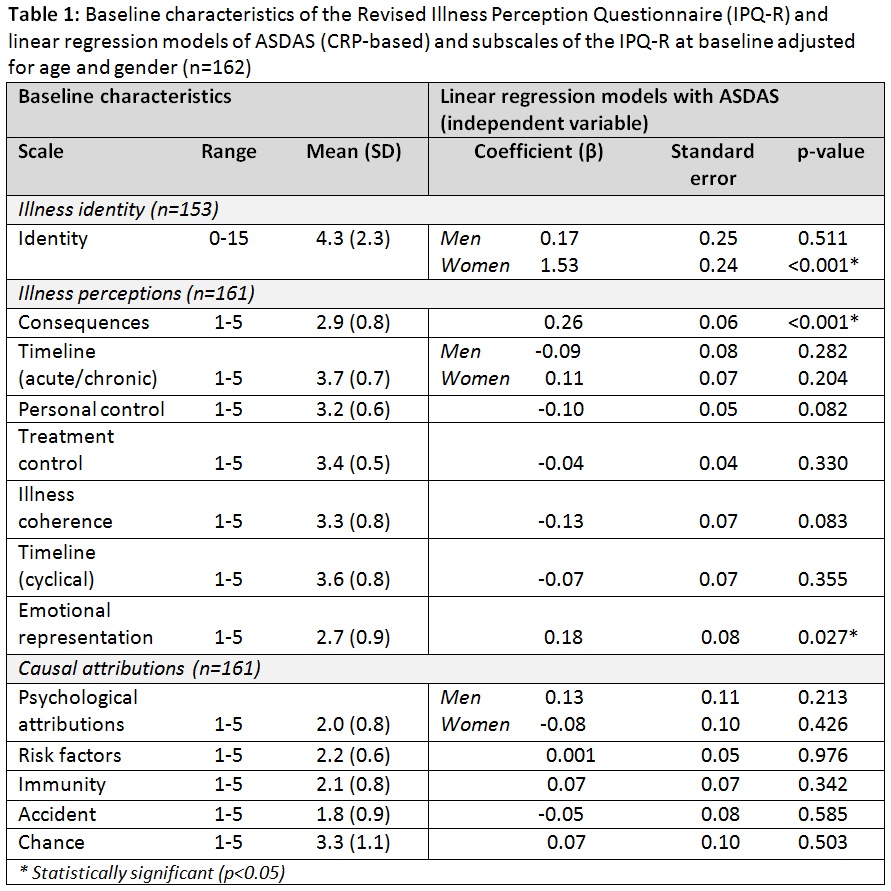Session Information
Date: Tuesday, November 15, 2016
Title: Spondylarthropathies and Psoriatic Arthritis – Clinical Aspects and Treatment - Poster III
Session Type: ACR Poster Session C
Session Time: 9:00AM-11:00AM
Background/Purpose: Studies in patients with rheumatic diseases report that negative views of illness are associated with poorer disease outcomes, such as more disability and pain. Little is known about illness perceptions in patients with early axial Spondyloarthritis (axSpA). The aim is to describe illness perceptions and to explore the association with disease activity in patients with early axSpA at baseline.
Methods: The SPACE-cohort includes patients (chronic back pain ≥3 months, ≤2 years, onset <45 years) recruited from 5 participating centers in Europe. Patients completed the Revised Illness Perception Questionnaire (IPQ-R). The illness identity dimension asked patients if they have experienced a certain symptom (15 in total) and if they believed these symptoms are related to axSpA. The other illness perception dimensions (7 dimensions) and causal attributions (5 dimensions) used 5-point Likert scales to score all items ranging from 1 (strongly disagree) to 5 (strongly agree). For the IPQ-R dimensions, see Table 1. Disease activity was assessed by ASDAS (Ankylosing Spondylitis Disease Activity Score, CRP based). Univariable linear regression models were built for each IPQ-R dimension as dependent and ASDAS as independent variable adjusted for age and gender.
Results were stratified when gender was an effect modifier (p<0.20). P-values <0.05 were considered to be statistically significant.
Results: Only patients fulfilling the ASAS classification for axSpA (n=162/400) were included. Patients had a mean age of 30.0 (SD 8.0) years and 51.9% were male. The mean disease duration was 13.9 (SD 8.1) months and the mean ASDAS 2.5 (SD 0.9). Patients reported on average 4.3 (SD 2.3) symptoms to be associated with axSpA on average (Table 1). Pain, joint stiffness, fatigue, and sleeping problems were the most reported symptoms according to patients in the illness identity dimension. All other dimensions showed a mean of approximately 3, except psychological attributions, risk factors, immunity, and accident of the causal section, which had a mean of approximately 2. Patients with axSpA attributed their complaints mostly to heredity, chance and bad luck. Three dimensions of the IPQ-R were associated with ASDAS. A higher ASDAS was statistically significantly associated in all patients with stronger beliefs in severe consequences (β=0.26, p<0.001), more negative emotions towards their complaints (β=0.18, p=0.027), and in women with more symptoms attributed to axSpA (β=1.53, p<0.001). There was a trend between a higher ASDAS and less belief in personal control (β=-0.10, p=0.082) and less illness coherence (β=-0.13, p=0.083).
Conclusion: In patients with early axSpA, disease activity is associated with negative illness perceptions, such as attribution of multiple symptoms, believing in severe consequences, and experiencing negative emotions towards axSpA.
To cite this abstract in AMA style:
van Lunteren M, Scharloo M, Kaptein A, Ez-Zaitouni Z, Bakker P, Fongen C, Landewé R, van Oosterhout M, Lorenzin M, van der Heijde D, van Gaalen F. Is Disease Activity Associated with Negative Illness Perceptions in Early Axial Spondyloarthritis Patients in the Spondyloarthritis Caught Early (SPACE)-Cohort? [abstract]. Arthritis Rheumatol. 2016; 68 (suppl 10). https://acrabstracts.org/abstract/is-disease-activity-associated-with-negative-illness-perceptions-in-early-axial-spondyloarthritis-patients-in-the-spondyloarthritis-caught-early-space-cohort/. Accessed .« Back to 2016 ACR/ARHP Annual Meeting
ACR Meeting Abstracts - https://acrabstracts.org/abstract/is-disease-activity-associated-with-negative-illness-perceptions-in-early-axial-spondyloarthritis-patients-in-the-spondyloarthritis-caught-early-space-cohort/

